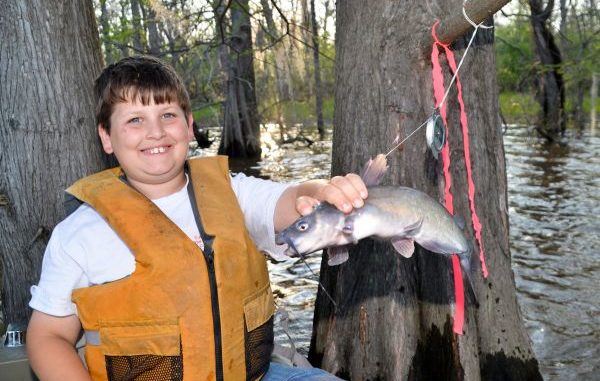
Yo-yos are one of those pieces of fishing gear that people either love or hate. Few people say, “Oh, yeah; they are OK, even though I don’t use them.”
And Arthur Manuel understands why.
“The problem is that some yo-yo fishermen leave them out (from trip to trip) with bait on the hooks,” Manuel drawled.
“Other fishermen see a fish hanging and say that all yo-yo fishermen are irresponsible.
“No one wants to see a dead fish hanging.”
The internal springs that make yo-yos effective are strong enough to reel small fish completely out of the water. Larger fish are heavy enough to stay submerged, and can live on hooks for days.
But leaving yo-yos out permanently is just a bad practice.
To worsen matters, some anglers attach wooden or metal cross arms to trees in lakes from which to hang their yo-yos. These are just plain ugly and interfere, to some degree, with traditional hook and line fishermen.
They also encourage yo-yo owners to leave their yo-yos out permanently to “hold their spot.”
Manuel’s own half-brother, Evans Dauzat, who Manuel calls “a real good white perch fisherman,” is among those who dislike the gear.
“Some people put out 200 of them and leave them,” Dauzat said. “What are they going to do with all the fish?”
Manuel is a responsible yo-yo user.
“I pick my yo-yos up every trip,” he said. “Before I leave, all my yo-yos will be in my bucket.”
He also confines his yo-yo fishing to the spring and fall, avoiding the heat of the summer, when fish die quickly on yo-yo hooks if the fisherman is not right on the spot to tend to them quickly.
“A lot of people love yo-yos, especially if they have kids and family,” Manuel said. “I’ve been fishing Saline (Lake) since 2002. I didn’t yo-yo fish the first three or four years. I like to rod-and-reel fish for sac-a-lait with shiners being my main bait. I will use tube jigs in the winter, though.
“I had (yo-yo fished) in the past, but really started doing it here with the kids. Sometimes with a pole, it gets boring for them. Yo-yos are dependable. It’s exciting too — and it’s a challenge dealing with the elements. A lot of people have never tried it.”
Grandson Tyler, who has been listening intently, chimed in.
“When you fish yo-yos, you catch a mess of fish,” he said. “With a pole, you have to wait and wait; you are hoping for the best in one spot. But it’s work, too. Some people are just lazy. They won’t get off their butts.”
Still, Manuel noted, some places (mainly reservoirs) have restrictions on their use. Fishermen need to check the rules before you use them in a place new to them.
“Where they are legal, they are bread and butter for a fish fry,” he said. “They fish better than I do.”